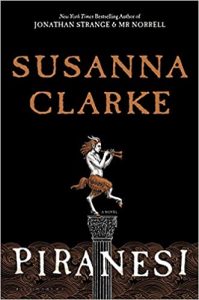The Year in Review 2021 by Rich Horton

This issue of Locus is the 20th anniversary of my first column on short fiction for the magazine. It also contains my last such column. (Not to worry (or perhaps to worry?) I’ll still be contributing occasional work to Locus.) That issue also contained my first “end of the year summary” essay, so this is my 21st. While I expect I’ll continue writing these in coming years, it seems worthwhile to make this something of a semi-valedictory.
Last year I wrote about SF in a plague year. I was overoptimistic – I had hopes that 2021 would put the plague behind us – and of course it did not. A variety of factors have made 2021 as bad a year as 2020 in many ways, some avoidable (vaccine resistance, mainly) and some the result of COVID’s nature, its ability to mutate. Unfortunately, at least two of these mutations, Delta and Omicron, are more transmissible than the original COVID variants, and have led to significant surges of the illness. Fortunately, between the fairly robust protection vaccination offers and, in the case of Omicron, its apparent mildness compared to the first variants, comparatively fewer cases, by percentage, have severe outcomes, though to be sure a smaller percentage of a very large number has still meant a lot of deaths. Even so, as we enter 2022, it really seems fair to at least hope that this will be a much better year.
But it is not my place, nor expertise, to lecture on COVID, or on the politics of COVID, or any such thing. I will talk about SF, I promise, but this being a valediction of sorts, a personal aside. Last year I wrote happily of the birth of my first grandchild, the impossibly cute Adelaide. This year, I am writing this essay in my daughter’s home, as she has just borne her second child – another cutie, August. (Truth be told, Addy and Gus – and another grandson due this coming June! – are among the reasons I’m stepping back, at least to some extent, from my Locus responsibilities.) These children are a reminder for me, certainly, of the true joys we can have even in such fraught times.
One of the things I have desperately missed these past two years is SF conventions, and, more importantly, the people I normally meet at SF conventions! I had hoped that things would be better in 2022, and I suppose they were, marginally – I made it to two fairly local cons. My hoped-for trip to World Fantasy had to be cancelled for COVID-related reasons (thankfully, not an actual case) and I didn’t make Worldcon for a much better reason – my grandson’s birth that very week! While without question the loss of life due to the plague is its worst effect, this loss of community, of sociability, is truly a blow as well, and I dearly hope to see more of my SF friends in 2022.
So, what of the SF I read in 2021? Was it a great year or a bad year? Was it noticeably affected by 2020? It’s hard to pinpoint overall quality that well until some time has passed, but my first thoughts are that it was a pretty darned strong year. Events always affect writers, but not always in the obvious ways – I don’t think there was a huge outpouring of plague stories, at any rate – but I think we may see, a few years out, some overall result, a shift in tone, perhaps. I can’t pinpoint that yet, however. I think it best to simply list a personal Top Ten. So, in no particular order, these were my ten favorite stories of 2021, out of the venues I review:
“If the Martians Have Magic”, P. Djèlí Clark (Uncanny 9-10/21)
“The Pattern of a Proper Life”, William H. Gass (Conjunctions:76)
“Proof by Induction”, José Pablo Iriarte (Uncanny 5-6/21)
“The Dark Ride”, John Kessel (F&SF 1-2/20)
“The Metric”, David Moles (Asimov’s 5-6/21)
“Where Oaken Hearts Do Gather”, Sarah Pinsker (Uncanny 3-4/21)
“Crazy Beautiful”, Cat Rambo (F&SF 3-4/21)
“The Ghost Birds”, Karen Russell (The New Yorker, 10/11/21)
“Three Tales from the Blue Library”, Sofia Samatar (Conjunctions:76)
“January House”, Alexandra Seidel (Not One of Us 1/21)
“Unseelie Brothers, Ltd.”, Fran Wilde (Uncanny 5-6/21)
Okay, that was 11! I apologize – but one of them, the Gass story, isn’t really SF or fantasy, so I beg your indulgence.
 As usual, I have little to say about 2021’s novels (another reason, I suppose, to step back a bit from short fiction reviewing – to read more novels!). The bulk of my novel reading, actually, was an experiment of sorts: I listened to one novel a month. Partly at random, each one was by a woman. (The first few were by accident, I should say, but after that I figured I’d purposely keep “hearing” novels by women for at least a year.) This really did help me catch up some, with writers like Sarah Pinsker, Elizabeth Hand, Alix E. Harrow, and Tamsyn Muir, whose short fiction I had loved but whose novels I’d to that point skipped; as well as some recent award winners I’d missed, such as The Goblin Emperor, Piranesi, and, most recently, Network Effect. (Okay, Piranesi hasn’t won any major SF awards, but it did win the Women’s Prize!) I certainly found this reading – all novels from the past several years – strong evidence that the field is in great shape.
As usual, I have little to say about 2021’s novels (another reason, I suppose, to step back a bit from short fiction reviewing – to read more novels!). The bulk of my novel reading, actually, was an experiment of sorts: I listened to one novel a month. Partly at random, each one was by a woman. (The first few were by accident, I should say, but after that I figured I’d purposely keep “hearing” novels by women for at least a year.) This really did help me catch up some, with writers like Sarah Pinsker, Elizabeth Hand, Alix E. Harrow, and Tamsyn Muir, whose short fiction I had loved but whose novels I’d to that point skipped; as well as some recent award winners I’d missed, such as The Goblin Emperor, Piranesi, and, most recently, Network Effect. (Okay, Piranesi hasn’t won any major SF awards, but it did win the Women’s Prize!) I certainly found this reading – all novels from the past several years – strong evidence that the field is in great shape.
I’m often asked what trends I see in SF, and often I fumble the answer. Two things I mentioned recently are an interest in “posthumanism,” and a greater-than-ever tendency to blur or ignore the boundaries (if they even exist) between SF and fantasy. (The two work together when the powers of “posthumans” become, in Clarke’s words, “indistinguishable from magic.” Though, as Philip K. Dick showed as far back as “The Golden Man”, some of the most interesting posthumans are not necessarily more powerful than contemporary humans – just different.) Thinking about this again today, and relative to my column, I think the breadth of the field, in two important dimensions, is a really key change. One is diversity of subject matter, of writers, of languages, as evidenced by the continued increasing visibility of women writers, of LGBTQ+ writers, of non-binary writers, of Black, Asian, and Hispanic writers; and of fiction in translation. The other is in breadth of publication venues – most obviously, right as I was beginning my Locus column, we saw an explosion of online publishing; but also, and perhaps more interesting to me right now; we see much more SF published in non-SF venues. Those I’ve followed most closely are the New Yorker, Conjunctions, and the sadly defunct Tin House; but you can find SF or fantasy in numerous other literary magazines (Zyzzyva, Zoetrope, Harper’s, Paris Review, etc.) and also non-fiction outlets like Nature, Slate, and the MIT Technology Review. (Plus, of course, many non-genre writers, like Karen Russell, Colson Whitehead, Kazuo Ishiguro, and Emily St. John Mandel, have published brilliant SF at longer lengths.) This is all to the good, in my view.
I also thought – what better way to follow changes in the field than to follow the exciting new names that keep popping up – from Kelly Link to Theodora Goss to Benjamin Rosenbaum to N.K. Jemisin to Rachel Swirsky to C.S.E. Cooney to Alaya Dawn Johnson to Ann Leckie to Genevieve Valentine to Sofia Samatar to Ray Nayler to E. Lily Yu to Tade Thompson to P. Djèlí Clark. Such a litany of names is beautiful – and it shouldn’t obscures names established well before who continue to delight us, like Robert Reed and Elizabeth Hand and Gregory Feeley and Ian MacDonald and Ian MacLeod and Ted Chiang and Kij Johnson and Adam-Troy Castro and Nancy Kress. And of course I could go on – the riches of imagination I get to read is a continuing wonder.
I think, too, of the greats of the field who I got to meet in the past two decades and who have since left us. There are too many to mention, but three giants stand out – my colleague here at Locus, Gardner Dozois, one of the field’s greatest editors (and a damn fine writer), as well as two of the very greatest writers not just of SF but in American literature: Gene Wolfe and Ursula K. Le Guin.
I’ll sign off (but not forever!) by thanking everyone at Locus who welcomed me to the magazine, encouraged me, made me a better writer, and became friends. Our founder, the late Charles N. Brown comes first (and I greatly regret I never met him in person). Our editor, Liza Groen Trombi. Arley Sorg. Tim Pratt. Francesca Myman. Gary Wolfe. My fellow short fiction columnists: Nick Gevers, Gardner Dozois, Paula Guran, and Karen Burnham. My predecessor, Mark Kelly, who was the first person to invite me to write for the magazine in its online incarnation. Above all, Jonathan Strahan, who has been my editor for my entire time here, and who has quietly and immensely improved my writing, and saved me from too many faux pas to remember (thankfully!) and who has had to put up with some terrifyingly late column submissions. And, who, best of all, I can consider a friend – a critical part of my community, our community, the SF field, something I deeply love.
Rich Horton works for a major aerospace company in St. Louis MO. He has published over a dozen anthologies, including the yearly series The Year’s Best Science Fiction and Fantasy from Prime Books, and he is the Reprint Editor for Lightspeed Magazine. He contributes articles and reviews on SF and SF history to numerous publications.
This review and more like it in the February 2022 issue of Locus.
 While you are here, please take a moment to support Locus with a one-time or recurring donation. We rely on reader donations to keep the magazine and site going, and would like to keep the site paywall free, but WE NEED YOUR FINANCIAL SUPPORT to continue quality coverage of the science fiction and fantasy field.
While you are here, please take a moment to support Locus with a one-time or recurring donation. We rely on reader donations to keep the magazine and site going, and would like to keep the site paywall free, but WE NEED YOUR FINANCIAL SUPPORT to continue quality coverage of the science fiction and fantasy field.
©Locus Magazine. Copyrighted material may not be republished without permission of LSFF.






